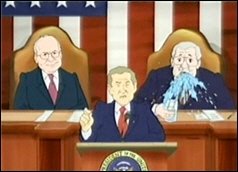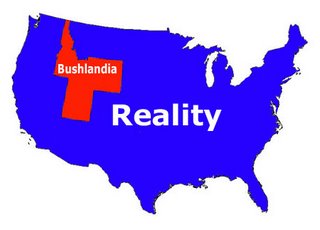Top Ten Signs of the Impending U.S. Police State
Hey America! Freedom is
just around the corner…behind you
Allan Uthman

The Internet Clampdown
One saving grace of alternative media in this age of unfettered corporate conglomeration has been the internet. While the masses are spoon-fed predigested news on TV and in mainstream print publications, the truth-seeking individual still has access to a broad array of investigative reporting and political opinion via the world-wide web. Of course, it was only a matter of time before the government moved to patch up this crack in the sky. Attempts to regulate and filter internet content are intensifying lately, coming both from telecommunications corporations (who are gearing up to pass legislation transferring ownership and regulation of the internet to themselves), and the Pentagon (which issued an “Information Operations Roadmap” in 2003, signed by Donald Rumsfeld, which outlines tactics such as network attacks and acknowledges, without suggesting a remedy, that US propaganda planted in other countries has easily found its way to Americans via the internet). One obvious tactic clearing the way for stifling regulation of internet content is the growing media frenzy over child pornography and “internet predators,” which will surely lead to legislation that by far exceeds in its purview what is needed to fight such threats.
“The Long War”
This little piece of clumsy marketing died off quickly, but it gave away what many already suspected: the War on Terror will never end, nor is it meant to end. It is designed to be perpetual. As with the War on Drugs, it outlines a goal that can never be fully attained—as long as there are pissed off people and explosives. The Long War will eternally justify what are ostensibly temporary measures: suspension of civil liberties, military expansion, domestic spying, massive deficit spending and the like. This short-lived moniker told us all, “get used to it. Things aren’t going to change any time soon.”
The USA PATRIOT Act
Did anyone really think this was going to be temporary? Yes, this disgusting power grab gives the government the right to sneak into your house, look through all your stuff and not tell you about it for weeks on a rubber stamp warrant. Yes, they can look at your medical records and library selections. Yes, they can pass along any information they find without probable cause for purposes of prosecution. No, they’re not going to take it back, ever.
Prison camps
This last January the Army Corps of Engineers gave Halliburton subsidiary Kellogg Brown & Root nearly $400 million to build detention centers in the United States, for the purpose of unspecified “new programs.” Of course, the obvious first guess would be that these new programs might involve rounding up Muslims or political dissenters—I mean, obviously detention facilities are there to hold somebody. I wish I had more to tell you about this, but it’s, you know…secret.
Touchscreen Voting Machines
Despite clear, copious evidence that these nefarious contraptions are built to be tampered with, they continue to spread and dominate the voting landscape, thanks to Bush’s “Help America Vote Act,” the exploitation of corrupt elections officials, and the general public’s enduring cluelessness.
In Utah, Emery County Elections Director Bruce Funk witnessed security testing by an outside firm on Diebold voting machines which showed them to be a security risk. But his warnings fell on deaf ears. Instead Diebold attorneys were flown to Emery County on the governor's airplane to squelch the story. Funk was fired. In Florida, Leon County Supervisor of Elections Ion Sancho discovered an alarming security flaw in their Diebold system at the end of last year. Rather than fix the flaw, Diebold refused to fulfill its contract. Both of the other two touchscreen voting machine vendors, Sequoia and ES&S, now refuse to do business with Sancho, who is required by HAVA to implement a touchscreen system and will be sued by his own state if he doesn’t. Diebold is said to be pressuring for Sancho’s ouster before it will resume servicing the county.
Stories like these and much worse abound, and yet TV news outlets have done less coverage of the new era of elections fraud than even 9/11 conspiracy theories. This is possibly the most important story of this century, but nobody seems to give a damn. As long as this issue is ignored, real American democracy will remain an illusion. The midterm elections will be an interesting test of the public’s continuing gullibility about voting integrity, especially if the Democrats don’t win substantial gains, as they almost surely will if everything is kosher.
Bush just suggested that his brother Jeb would make a good president. We really need to fix this problem soon.
Signing Statements
Bush has famously never vetoed a bill. This is because he prefers to simply nullify laws he doesn’t like with “signing statements.” Bush has issued over 700 such statements, twice as many as all previous presidents combined. A few examples of recently passed laws and their corresponding dismissals, courtesy of the Boston Globe:
Dec. 30, 2005: US interrogators cannot torture prisoners or otherwise subject them to cruel, inhuman, and degrading treatment.
Bush's signing statement: The president, as commander in chief, can waive the torture ban if he decides that harsh interrogation techniques will assist in preventing terrorist attacks.
Dec. 30: When requested, scientific information ''prepared by government researchers and scientists shall be transmitted [to Congress] uncensored and without delay."
Bush's signing statement: The president can tell researchers to withhold any information from Congress if he decides its disclosure could impair foreign relations, national security, or the workings of the executive branch.
Dec. 23, 2004: Forbids US troops in Colombia from participating in any combat against rebels, except in cases of self-defense. Caps the number of US troops allowed in Colombia at 800.
Bush's signing statement: Only the president, as commander in chief, can place restrictions on the use of US armed forces, so the executive branch will construe the law ''as advisory in nature."
Essentially, this administration is bypassing the judiciary and deciding for itself whether laws are constitutional or not. Somehow, I don’t see the new Supreme Court lineup having much of a problem with that, though. So no matter what laws congress passes, Bush will simply choose to ignore the ones he doesn’t care for. It’s much quieter than a veto, and can’t be overridden by a two-thirds majority. It’s also totally absurd.
Continue(if you dare):



















































